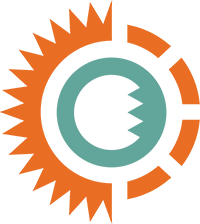THE GUIDING LIGHT OF OUR NAME
“The direct translation of ogichi daa kwe is often given as warrior woman, but maybe the better word is fighter, someone who is fighting to find the elevated being we have the potential to become, fighting to find our own strong spirit.”
BY Johanna Ernst
Most of us know Ogichi Daa Kwe means strong spirited woman. Some have heard the story about how the name was given to the camp by Nancy Jones, the mother of Pebaam, who is a good friend and has taught our camp community about Ojibwe culture for the past decade. It would be a shame not to know more about our name and Nancy.
After camp ended last summer, a group of us went to visit Nancy in the village of Nigigoonsiminikaaning, formerly known as Red Gut Bay First Nation. Nigigoonsiminikaaning is just 13 miles east of our camp by boat. Grace Gardner, Juliann Gardner, Alex Ernst, Pebaam, his brother Don, and I talked with Nancy about the origins of the girls camp, the land it is on, and why the creation of a girls program was so important.
You’d be hard pressed to find a stronger spirit. Nancy is the mother of eight children, a respected elder, and a lifelong educator. She has a teaching degree from Lakehead University in Thunder Bay, and taught Ojibwe language and culture at Mine Centre Public School and Rainy River Community College. After spending some time with her, my guess is she is equally proud of the respect she gained from other trappers, including winning several awards from the Ontario Trapping Association for her ability to quickly create beautiful beaver and marten pelts, as she is of winning a Lifetime Achievement Award from the Minnesota Indian Education Association and recognition from many other civic associations.
Nancy and Camp Kooch-i-ching’s former director, Tim Heinle, were friends. Nancy took an interest in the creation of a girls camp, one to complement Camp Kooch-i-ching. One of Nancy’s core beliefs is that there is a divine balance in the world. If there is a boys camp, the creation of a girls camp would bring balance and harmony.
Pebaam explains, “She gave the name and she also gave a small healing blanket. She had a dream, a vision, that we don’t honor each other enough and she hoped the healing blanket would be a reminder to honor each other and by doing so, we will be healing each other. To honor someone is to recognize each other’s strength and importance in the world. And, to recognize and respect each other’s differences is where the healing comes in.”
When asked to comment on our name, Pebaam, who taught Ojibwe language, culture and history at the University of Minnesota in Minneapolis, expanded, “The direct translation of ogichi daa kwe is often given as warrior woman, but maybe the better word is fighter, fighting to find the elevated being we have the potential to become, fighting to find our own strong spirit.”
As we sat on the porch, Nancy explained when the term ogichi daa kwe is used within the Ojibwe community, it is an inclusive term meant for every female. It is not used to single women out or place them in a hierarchy. Being a true ogichi daa kwe is about raising each other up with the knowledge that we are stronger together.

